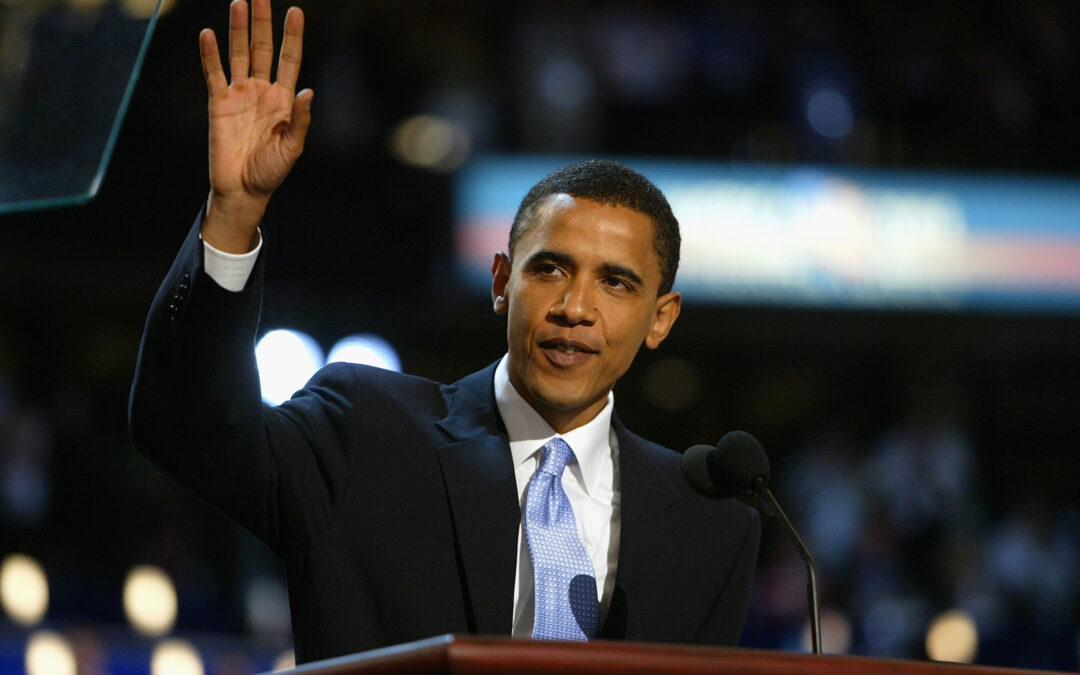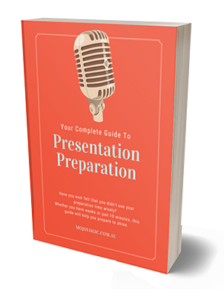It’s that fundamental belief — I am my brother’s keeper, I am my sisters’ keeper — that makes this country work. It’s what allows us to pursue our individual dreams, yet still come together as a single American family. “E pluribus unum.” Out of many, one.
In 2004, then Illinois senate candidate, Barack Obama delivered the keynote address at the Democratic National Convention in Boston. At this point, Obama was not particularly well known. This fine example of oratorical mastery helped to propel him forward in the minds of his party, his country and the world.
This is the speech that set Obama on the path to his presidency.
Barack Obama as Speaker – Style + Substance
At the podium, Obama almost always adopts a high, or formal, style. He accesses a vast vocabulary, is comfortable with literary allusions and even happy to throw in the odd bit of Latin. Certainly not casting himself in the role of ‘a knock-about’. Neither does he use his mastery of language as an instrument of superiority.
The unique ‘Obama-esque’ style is rather more enigmatic.
Taking the high ground
Barack Obama debuts what will become his signature style in this speech. A formality that manages to reach across social and economic divides. His style is much more that the words he uses or even the references he makes.
Obama’s oratorical demeanor is a reflection of his political ethos which in turn is a reflection of his character. It is all about rising above the constructs of partisan politics, race, geography and religion that may divide us and embracing a new form of equality. A loftier view.
…there’s not a liberal America and a conservative America — there’s the United States of America. There’s not a black America and white America and Latino America and Asian America; there’s the United States of America.
The language is lofty indeed but coupled with the sense of occasion, a receptive audience and the ability to connect on an emotional level – such lofty expressions as these carry power:
I believe that as we stand on the crossroads of history, we can make the right choices, and meet the challenges that face us. America!
Link to predecessors
Obama strengthens his position by borrowing credibility from his political forebearers. He alludes to the intentions of the founders as the measure for what one ought to do, rather than being mired in the day to day political wrangling of an election.
Our pride is based on a very simple premise, summed up in a declaration made over two hundred years ago, “We hold these truths to be self-evident, that all men are created equal. That they are endowed by their Creator with certain inalienable rights. That among these are life, liberty and the pursuit of happiness.”
And…
This year, in this election, we are called to reaffirm our values and commitments, to hold them against a hard reality and see how we are measuring up, to the legacy of our forbearers, and the promise of future generations.
Concrete Language and Detail
How does Barack Obama, in such a short speech, manage to form an emotional connection with so many people? He does this by balancing his high style with a more commonplace method of communication. Like many great speakers, he uses concrete rather than abstract language to form a human connection. By describing specific people, places and things his audience is drawn into the story.
- Rather than blue-collar workers facing possible redundancy due to the forces of globilisation we meet; “workers in Galesburg Illinois who are losing their union jobs at the Maytag plant that is moving to Mexico”. We are introduced to the father that needs money to pay for his son’s education and the young women who can’t afford to go to college.
- Rather than recognising the veterans that served in the military we are introduced to “a young man named Shamus at the VFW Hall in East Moline, Illinois. He was a good-looking kid, 6’2″ or 6’3″, clear-eyed, with an easy smile”.
- Rather than shared values between predominantly Republican states versus predominantly Democrat states we hear that “we worship an awesome God in the blue states and we don’t like federal agents poking around in our libraries in the red states”.
In analysing this technique, I am reminded of the iconic ‘I Have a Dream” speech by Martin Luther King Jnr where we are transported to “the red hills of Georgian” and Dr King’s “four little children”.
A Powerful Personal Story
He opens with a story that is deeply personal. Obama tells us of his parents and his grandparents – the dreams they had and the hopes they shared. He paints a picture of the lives that they each led. We are transported to the village in Kenya and a starter home in Kansas.
This is a masterstroke in building a strong connection to hook in the audience. The power of this particular story is amplified by hitting all three key tenets:
- it is personal
- it is true
- it is relevant
Once the story is told, Obama makes sure to make the connection to his thesis clear:
I stand here today, grateful for the diversity of my heritage, aware that my parents’ dreams live on in my precious daughters. I stand here knowing that my story is part of the larger American story, that I owe a debt to all of those who came before me, and that, in no other country on earth, is my story even possible.
Obama’s Rhetorical Technique
Barack Obama is skilled in rhetorical technique. Like all skilled rhetoricians, he manages to hide the mechanics the craft in favour of the overall impact of his message – here are some examples:
Anaphora
Anaphora is when you repeat a word or phrase at the beginning of successive clauses.
I say to you tonight: we have more work to do… More to do for the workers I met… More to do for the father I met… More to do for the young woman in East St. Louis…
Then;
John Kerry believes in an America where hard work is rewarded. John Kerry believes in an America where all Americans can afford the same health coverage… John Kerry believes in energy independence… John Kerry believes in the constitutional freedoms… And John Kerry believes that in a dangerous world…
And;
Well, I say to them tonight, there’s not a liberal America and a conservative America — there’s the United States of America. There’s not a black America and white America and Latino America and Asian America; there’s the United States of America.
Metaphor and Idiom
Red states and Blue states…
Stars and stripes…
The crossroads of history…
The Audacity of Hope
This is a speech that launched a president. A fine example of oratorical genius that inspires adacious hope.
__________________________________________________
A Speech a Week Series
Words have the power to change the world. Speeches are used by leaders, revolutionaries and evangelists to persuade people to think differently, to feel something new and to behave in remarkable ways.
In this series we will examine one notable speech per week. We hope to cast a wide net – including politicians, business leaders, preachers, entertainers and philosophers. These articles will consider matters of content and style to uncover the secrets of oratorical success.
By examing the components of speechcraft we can improve our own powers of persuasion. We will come to appreciate the craft of eloquence – guarding against silver-tongued miscreants whilst gradually building our own expressive capability.
If you would like to contribute to the series by suggesting a speech, please send us a message via the mojologic website.


